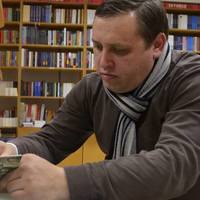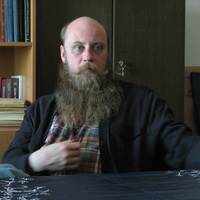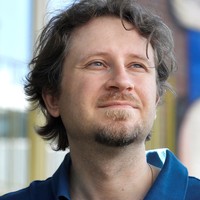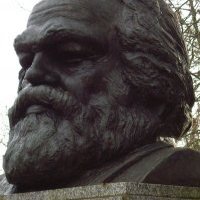
Olena Palko
I have received my PhD from the School of History, the University of East Anglia in 2017. In 2017-18, I will be based at the University of Basel, as a post-doctoral URIS fellow. In the academic year 2013-14 I was based at the Centre Marc Bloch at the Humboldt University of Berlin as a scholarship holder with the Studienstiftung des Abgeordnetenhauses von Berlin (Academic Foundation of the Berlin House of Representatives).
My doctoral thesis investigates the complex and multi-faced process of cultural sovietisation of Ukraine. The study argues that different political and cultural projects of a Soviet Ukraine were put to the test during the 1920s. These projects, as outlined, were developed and executed by the representatives of two ideological sections within the Communist Party of Bolsheviks of Ukraine, the one, originated in the Ukrainian socialist and communist movement, and another, with a clear centripetal orientation towards Moscow. As it is shown, the representatives of these two ideological horizons endorsed different approaches to defining Soviet culture. The study of cultural sovietisation leads to better understanding of the complex process of establishing and consolidating the Soviet regime in Ukraine.
Supervisors: Dr Matthias Neumann and Dr Francis King
My doctoral thesis investigates the complex and multi-faced process of cultural sovietisation of Ukraine. The study argues that different political and cultural projects of a Soviet Ukraine were put to the test during the 1920s. These projects, as outlined, were developed and executed by the representatives of two ideological sections within the Communist Party of Bolsheviks of Ukraine, the one, originated in the Ukrainian socialist and communist movement, and another, with a clear centripetal orientation towards Moscow. As it is shown, the representatives of these two ideological horizons endorsed different approaches to defining Soviet culture. The study of cultural sovietisation leads to better understanding of the complex process of establishing and consolidating the Soviet regime in Ukraine.
Supervisors: Dr Matthias Neumann and Dr Francis King
less
Related Authors
Andreas Umland
National University of "Kyiv-Mohyla Academy"
Igor Casu
State University of Moldova
Armando Marques-Guedes
UNL - New University of Lisbon
Fjodor Uspenskij
Vinogradov Russian Language Institute
Florin Curta
University of Florida
Volodymyr Ishchenko
Freie Universität Berlin
Peter D. Thomas
Brunel University
Juraj Marušiak
Slovak Academy of Sciences
Marijeta Bozovic
Yale University
Niccolò Pianciola
Università degli Studi di Padova










Uploads
Papers by Olena Palko
In recent weeks, Ukraine has become the focus of world media covering the Russian invasion of Ukraine. Behind those headlines, remain the complex developments in Ukraine’s history, national identity, culture and society. This course has been designed to offer a scholarly overview of Ukraine’s history, culture and identity. It is intended for all those wishing to learn more about Ukraine, its past and its present.
The organisers invite paper proposals examining minority groups in the successor states of the former Habsburg, Ottoman and the western areas of the Russian Empires between the world wars. Local case-studies and papers exploring the subject of interwar minorities from a ‘bottom-up’ perspective are particularly encouraged. Key themes to consider include:
- local and community politics, especially before 1938
- the role of state, cultural or religious institutions in the development of minority
identities and processes of engagement
- the formation, or evolution, of international networks including diasporas and cross-
border connections
- education, sport and mass culture as vehicles for consolidating or expressing
identities
- relations between different minority groups and different types of inter-communal exchange
The main focus of this study is on the theoretical works of Otto Bauer and Karl Renner. While the author aims to scrutinize the concept of a "nation", as elaborated within those works, most common views to classify the national theory of Austromarxism as part of the cultural or psychological theories of a nation have been challenged. Instead, the author distinguishes two main components within a broader category of a nation: 1) nation as a cultural concept; 2) nation as a political and legal concept. The understanding of a nation as a cultural community, all members of which are united by common and shared history, tradition, character, fate etc was introduced to define the general theoretic idea of the ethnic and national diversity. Whereas nation as a legal and political concept was instrumental in addressing the need to a nation and a state in their rights. Therefore, already in the beginning of the 20th century the basic democratic approach to distinguishing a state (seen as the all-nation body) and a civil society (the representatives of all nations within a state borders) has been introduced within the theory of Austromarxists.
The main phases of national development as proposed within the theory of Austromarxism are discussed. The periodization of national development that was proposed by Otto Bauer is seen one of the first theories of national renaissance in the 20th century. Bauer revised the Marxist concept of ‘nonhistoric’ peoples and rejected its basic premises to show that each nation can gain its status and become ‘a socialist nation’. These theoretical attempts seeking to understand the process of national development has been studied within the European socialist movement and compared to approaches proposed by Karl Kautsky, Rosa Luxemburg and Vladimir Lenin.
The study’s main objective is to investigate the concept of cultural and national autonomy developed within the theory of Austromarxism. It has been studied within a broader historical context and against the approaches to divide the governing authority between the local (national) and governmental levels. The concept of national and cultural autonomy has been compared to other existing approaches for an administrative reform of the multinational states. At the same time, the applicability of this concept has been assessed highlighting its main shortcomings.
The study argues that the theory of Austromarxism had major impact on the intellectual space worldwide. In particular, its justification for the third was in the Marxist theory – between German model of Social Democracy and Russian Bolshevism – has had major effect and since have been further implemented in the European social and political thought of the late twentieth century.
Engaging with a wide range of primary and secondary sources, including literary and archival material, Palko grounds her argument in the cases of two celebrated and controversial Ukrainian artists: the poet Pavlo Tychyna and prosaist Mykola Khyl'ovyi. Through this unique biographical lens, Palko's skilled analysis of cultural construction sheds fresh light on the complex process of establishing and consolidating the Soviet regime in Ukraine. In doing so, Palko offers a timely re-assessment of the Russo-Ukrainian conflict and adds nuance to current debates on the relationship between national identity, the arts, and the Soviet state.
1, Winter 2021, pp. 201-209 (Review)